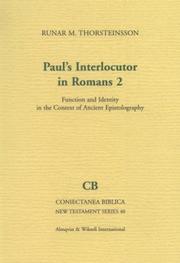| Listing 1 - 4 of 4 |
Sort by
|

ISBN: 9122020470 9789122020479 Year: 2003 Volume: 40 Publisher: Stockholm Almqvist and Wiksell
Abstract | Keywords | Export | Availability | Bookmark
 Loading...
Loading...Choose an application
- Reference Manager
- EndNote
- RefWorks (Direct export to RefWorks)
Book
ISBN: 9780199578641 Year: 2010 Publisher: Oxford Oxford University Press
Abstract | Keywords | Export | Availability | Bookmark
 Loading...
Loading...Choose an application
- Reference Manager
- EndNote
- RefWorks (Direct export to RefWorks)
Church history --- Stoics. --- Ethics, Ancient. --- Eglise --- Stoïcisme --- Morale ancienne --- Histoire --- 17.036.21 --- 27 "00/01" --- Stoïcisme. Stoa --- Kerkgeschiedenis--?"00/01" --- 17.036.21 Stoïcisme. Stoa --- Stoïcisme --- Ethics, Ancient --- Stoics --- Ethics --- Philosophy, Ancient --- Ancient ethics --- Apostolic Church --- Christianity --- Church, Apostolic --- Early Christianity --- Early church --- Primitive and early church --- Primitive Christianity --- Fathers of the church --- Great Apostasy (Mormon doctrine)
Book
ISBN: 9780199673568 019967356X 0191576794 9786612613593 1282613596 0199578648 0191722863 Year: 2013 Publisher: Oxford : Oxford University Press,
Abstract | Keywords | Export | Availability | Bookmark
 Loading...
Loading...Choose an application
- Reference Manager
- EndNote
- RefWorks (Direct export to RefWorks)
Christianity is commonly held to have introduced an entirely new and better morality into the ancient world, a new morality that was decidedly universal, in contrast to the ethics of the philosophical schools which were only concerned with the intellectual few. Runar M. Thorsteinsson presents a challenge to this view by comparing Christian morality in first-century Rome with contemporary Stoic ethics in the city.Thorsteinsson introduces and discusses the moral teaching of Roman Stoicism; of Seneca, Musonius Rufus, and Epictetus. He then presents the moral teaching of Roman Christianity as it i
Church history --- Stoics. --- Ethics, Ancient. --- Eglise --- Stoïcisme --- Morale ancienne --- Histoire --- Primitive and early church. --- 30-600. --- Stoïcisme
Book
ISBN: 9780198815228 0198815220 0191852996 0192546848 Year: 2018 Publisher: Oxford Oxford University Press
Abstract | Keywords | Export | Availability | Bookmark
 Loading...
Loading...Choose an application
- Reference Manager
- EndNote
- RefWorks (Direct export to RefWorks)
Jesus as Philosopher: The Philosophical Sage in the Synoptic Gospels examines the possible ways in which the authors of the Synoptic Gospels, Mark, Matthew, and Luke, were inspired by contemporary philosophical traditions about the ideal philosophical sage in their description of their ideal human being, Jesus Christ. Runar M. Thorsteinsson considers the following questions: How does the author in question speak of Jesus in relation to contemporary philosophy? Do we see Jesus take on a certain 'philosophical' role in the Gospels, either by his statements and reasoning or his way of life? In what way are Jesus' words and actions analogous to that of leading philosophical figures in Graeco-Roman antiquity, according to these texts? Conversely, in what way do his words and actions differ from theirs? While Thorsteinsson discusses a number of Graeco-Roman sources, the emphasis is on the question of how these parallel texts help us better to understand the Gospel authors' perception and presentation of the character of Jesus. While the fields of theology and ethics are often intertwined in these texts, including the philosophical texts, Thorsteinsson's main focus is the ethical aspect. He argues that the Gospel authors drew in some ways on classical virtue ethics. The study concludes that the Gospel authors inherited stories and sayings of Jesus that they wanted to improve upon and recount as truthfully as possible, and they did so in part by making use of philosophical traditions about the ideal sage, especially that of Stoicism and Cynicism. -- Publisher description.
225.08*8 --- 225.08*8 Theologie van het Nieuwe Testament: relatie met de klassieke oudheid --- Theologie van het Nieuwe Testament: relatie met de klassieke oudheid --- Philosophy. --- Teachings. --- Philosoph. --- Jesus Christ --- Jesus Christ. --- Jesus Christus. --- Bible. --- Bibel --- Criticism, interpretation, etc.
| Listing 1 - 4 of 4 |
Sort by
|

 Search
Search Feedback
Feedback About UniCat
About UniCat  Help
Help News
News